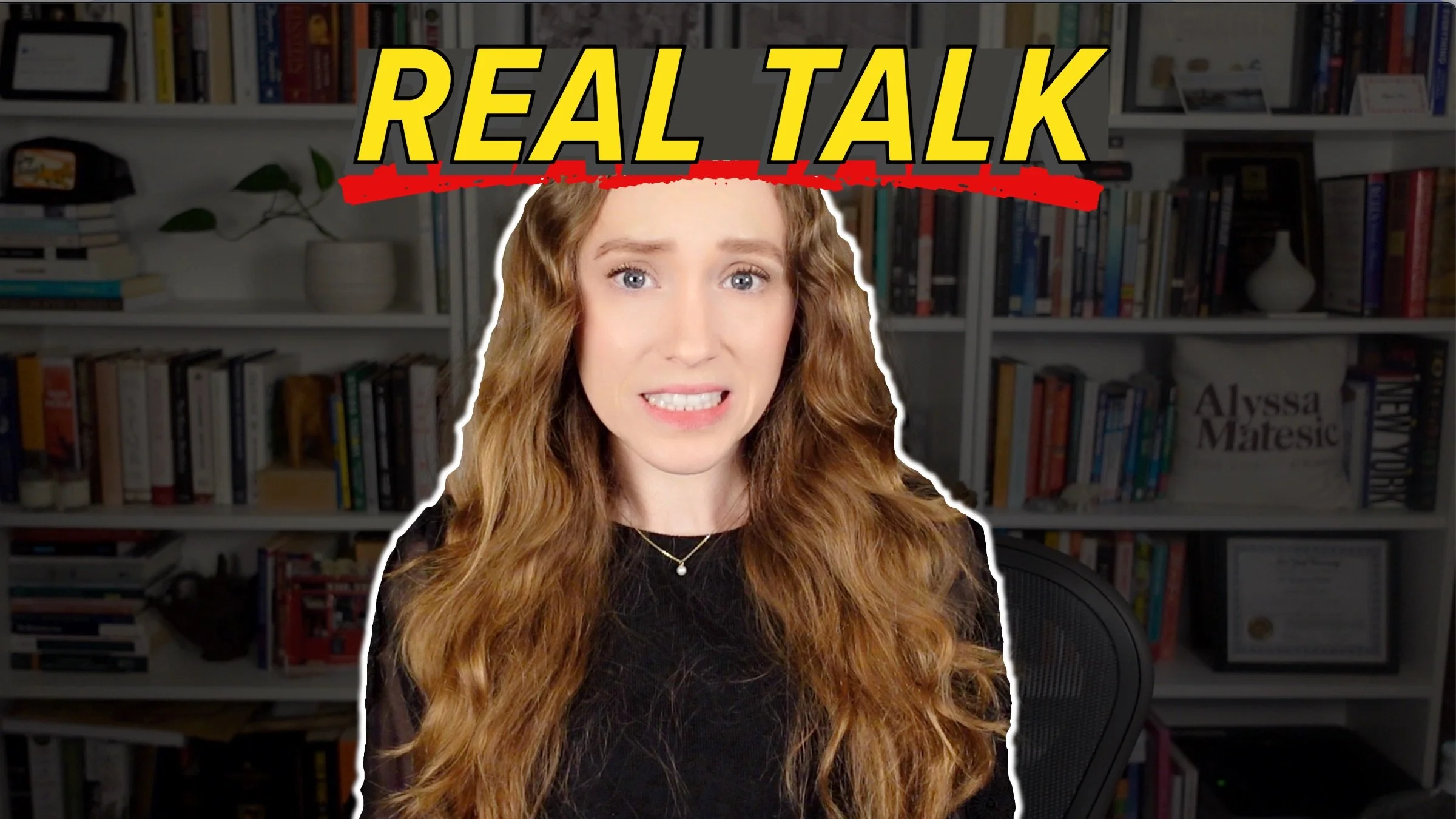Authors Beware! Book Scams to Look Out For
HIT PLAY OR READ THE POST BELOW:
Nearly every week, I get an email from a writer who received a “book deal” from an alleged publisher or a literary agent, and they want to know if it’s legit or a scam. In today's publishing landscape, it’s harder than ever to sort out what is legitimate and what is a scam because more and more scammers are targeting vulnerable authors who don't understand how the industry works. They are basically profiting off the author's desire to see their book published and their eagerness to get a response from anyone, and then scamming them out of a significant amount of money.
In this article, I'm going to talk through some steps to take to ensure that you avoid any potential book scams by being able to identify scams from legitimate deals. I'm also going to give a list of examples of scams that have been forwarded to me so that you're aware of them and can be on the lookout for them in your inbox.
Remember, it’s so important to protect your creative work and your book rights, so I recommend educating yourself on these scams even if you haven't received one yet.
So, what should you do if you are approached with a possible book scam?
Check Their Online Presence
Some of these publishing scams take the form of vanity publishing, which is where you pay an exorbitant fee to a publisher who appears to be reputable and claims they're going to provide you a bunch of services, but then they don't provide you anything you couldn't have gotten on your own via self-publishing, so it’s like you wasted that fee. Other times, there will be people who are posing as literary agents–even spoofing real literary agents’ names–and say they're going to offer representation or a book deal of some kind.
Either way, make sure you Google their names to see what comes up. If they claim that they’re affiliated with an organization, also look the company name up to see if they have a website. If not, that is a big red flag. Any publishing professional should have, at a minimum, a LinkedIn page as well as a page on their agency’s website, and many will also have a Twitter profile. The agency’s website should be robust and updated–if it hasn’t been updated in five years, they might no longer exist as a company, making it easy for scammers to steal their identity. Also make sure you read the URL links attached in any messages. Sometimes a scammer will alter a word or add a hyphen, which should let you know that they aren’t legit.
A legitimate agency should have a website that includes books they have recently published and authors they represent. If they don't have that information, that can be a sign of a scam. Similarly, any potential publisher should have a list of recently published books and you should be able to see the Amazon pages of those books.
If you’re trying to investigate an alleged publisher, check out the team page. Is it just one person running the show or do they have an actual team behind them? Do they have editors, designers, marketers, etc.? It's not necessarily a scam if the company or organization just has one person, but you do want to dive deeper into who that person is, what their reputation is, and what their professional background is to make sure they're legit.
The other place I want you to check is the Writer Beware blog. Sponsored by the Science Fiction and Fantasy Writers Association, the staff posts the publishing and literary agency scams they receive from authors, as well as a regularly updated list of known book scams. If someone contacts you, and they’re cross listed on Writer Beware’s blog–beware!
All that being said, it’s quite easy to spoof a website or an online presence, so don’t stop with just basic research.
Review Their Prior Books
If a publisher is reaching out to you, saying they want to offer you a book deal, it is very critical to determine if they are offering you a traditional book deal or a hybrid book deal. With a traditional book deal, you will not pay anything upfront to get published–actually, the publishing house is going to pay you for the rights to publish your book. This is how the major publishing houses in the U.S operate, and to gain access to them, you’ll typically need a literary agent’s representation.
When it comes to a hybrid publishing deal, they are going to ask you to pay upfront for some amount of services. This label is often misused, as many publishers who call themselves hybrid publishers are actually vanity publishers. Again, vanity publishers are publishers who are charging you a lot of money just for you to see your book published. They're not providing you any meaningful service.
This gray area is where a majority of scams occur, so I want you to be very careful if you are considering a book deal offer where you are being asked to pay money.
When we're talking about reviewing books by the publisher to determine their legitimacy, look at the general sales figures of these books, especially if the publisher is operating in the hybrid space. You can get an idea of the books’ sales by simply checking the number of reviews on Amazon and Goodreads. If the book has been out for a while and only has a couple of reviews, that's not a good sign, because it could indicate that there were not a lot of marketing and publicity efforts behind the book. Also take a look at the cover design, the marketing copy, the description, and overall presentation. If you can read some of the first pages, even better.
Ask yourself: would I be proud of this, if this were my book that was published? If the quality seems amateurish, then it's likely that the publisher didn’t invest a lot of editorial time into the book. I would even go so far as to reach out to the previous authors they have published and ask them about their experience of working with the publisher. They can give a lot of insight on the publisher’s processes and if they felt satisfied or not.
Vet Your Contract
If you go through those two steps and decide that this is a good book deal for you, don’t relax just yet! I recommend taking the next step, which is vetting your contract very thoroughly. Make sure you understand every last sentence in that contract, because if this person is scamming you, they are going to work things into the contract that contradict one another or slide in terms and conditions that they think you’ll overlook, and you do not want to screw yourself by just signing it straight away.
Most importantly, make sure you understand what exactly the publisher is going to provide you and what the rights and royalty splits are. This is especially important if you don't have a literary agent to help you navigate the legalese. Check if the publisher is going to provide marketing, sales, design, and editing support, or if you are going to be responsible for that on your own. With a hybrid deal, where you are paying upfront for services, also make sure you understand when those services will be delivered to you.
There are many freelancers that offer those services online, so you can also cross check their prices with what your publisher is trying to offer you. For instance, you can find a couple of freelance copy editors and see what their rate would be for a manuscript that’s 40,000 words. Then compare that to what the publisher is offering you–if it’s drastically high or low, that’s a red flag. Plus, a lot of these alleged hybrid publishers do outsource the editing and design work to freelancers anyways, so in some cases, it might make sense just for you to go to the freelancer directly.
As an author, you have to make sure you're getting your value from the publisher. The Authors Guild has a sample contract that has the different sections included in a standard book deal, so I definitely recommend checking your contract against that one as well.
Ask Lots of Questions
The last step to take to ensure you avoid any book scams is to ask tons of questions. As the author, you have every right to know exactly where, when, and how your book gets published. If a publisher or literary agent is shielding you from any of that information, that is a huge red flag.
Here are through some questions you should ask your potential publisher before signing:
Who will be responsible for editing, marketing, design, and sales?
What will be the advance structure and royalty rates?
Who will own the copyright to the work and when will it be registered?
What is your reversion of rights policy?
What is the share of subsidiary rights?
Where will my book be distributed?
What is the expected launch timeline?
When is the manuscript due?
How can the contract be terminated by either party?
Examples of Book Scams
To close out the article, I want to go through some examples of scam book deals that have been forwarded to me.
The first is a literary agent asking a fee to read and/or edit your manuscript before submitting it to publishers. The only way literary agents get paid is by a 15% commission from the book deal they get you. They should not charge anything upfront, so that is immediately a scam.
Another scam is a literary agency or publisher asking for fees to republish your book that has already been self-published. In most cases, when a book has already been self-published, a publisher–especially a Big Five publisher–is not going to be interested in republishing it. If you receive this message, this is likely a scam, especially if they’re charging you a fee.
The next scam is a literary agent or publisher not asking for any money upfront but asking for some kind of personal information, like a blank check, a money order, or a photo of your passport and ID. Remember: do not give any personal information, especially before you sign a contract and especially before you know what that personal information is for.
The next scam is when a filmmaker or a film agent contacts you because they want to make a movie adaptation of your book. In the book publishing industry, this is not how film rights get sold. These people would usually go through your literary agent and, if not, then your publisher.
Finally, there are some book scams built around fake promotion packages. In exchange for a huge fee, they claim to present your manuscript to a bunch of literary agents or publishers. Of course, we now know that’s not how the industry works at all–so steer clear from these offers.
I hope these tips help you better spot scam publishers and literary agents and protect your money and work.
Thanks so much for reading and happy writing!





